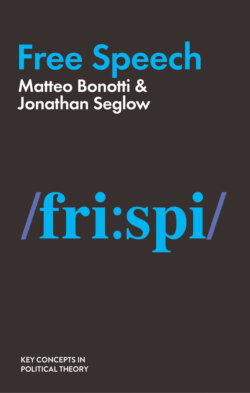Читать книгу Free Speech - Jonathan Seglow - Страница 7
1 Theories of Free Speech Introduction
ОглавлениеThere are plenty of potential justifications for free speech – explanations of why it is so valuable and important; and they tend to have a liberal flavour. One might argue that societies that respect their citizens’ free speech, especially on political and related matters, are more stable, more peaceful and more tolerant than societies that do not; or, relatedly, that free speech functions as a kind of safety valve, enabling citizens to express grievances without resorting to disorder or violence. Those grievances might take the form of low-value hate speech. Another justification is that many people value diversity and pluralism in political, artistic, religious, cultural and academic matters and free speech will enable expression of these values much better than would the state enforcement of an orthodoxy.
Freedom of speech can also be defended along the lines of a characteristically liberal scepticism towards government power. Given that legislators and public officials are prone to limiting individuals’ liberties for arbitrary or unjustifiable reasons, it is sensible to require them by law to protect free speech. As Frederick Schauer writes,
Freedom of speech is based in large part on a distrust of the ability of government to make the necessary distinctions [between speech that may be regulated], a distrust of governmental determinations of truth and falsity, an appreciation of the fallibility of political leaders, and a somewhat deeper distrust of government power in a more general sense. (Schauer 1982, p. 86)
It is no accident that all these are, broadly speaking, liberal arguments. Free speech is a liberal principle, indeed one of the liberal principles. This does not mean that other political perspectives cannot support free speech; socialist and conservative parties in democratic states generally and speech that may not support it too, for example. Nor does it mean that other philosophical and political views have nothing to offer the debate over free speech. In Chapter 5, when we look at pornography, for example, we will consider feminist, conservative, communitarian and virtue ethics arguments against pornography that stand opposed to liberal permissiveness. There are also recent efforts to outline a Marxist defence of free speech (Heinze 2018a, 2018b). But to claim that free speech is a liberal value is simply to draw attention to individual liberty, which is conceptually at its heart. This is true even if, as we will explore below, free speech is a matter of dialogue or democracy: it is speech between persons who are individually free to express and communicate their views. For this reason, apart from the exceptions noted, we shall not say very much about non-liberal approaches to free speech in this book.
We will focus instead on the three most prominent defences of free speech in the extensive literature on the topic. These theories are based on the values of truth, autonomy and democracy; and, as we will see, they are really families of views, since there are divisions within them. These three theories will help us to organise the discussion in the entire book, since they often have divergent – though sometimes overlapping – implications for deciding when speech may or should be limited.
In presenting these theories, we need to bear in mind two sets of distinctions. One is between claiming that free speech is valuable on the grounds that it is an essential means to achieve some further good, such as the good of diversity, or to avoid some harm, for example the harm of violent disorder, and claiming that free speech is inherently valuable independently of its consequences, as part of some larger moral or political ideal, for example the ideal that the value of personal autonomy should include the freedom to express oneself. The former type of claim is called consequentialist; the latter, deontological. The distinction between consequentialism and deontology is much discussed in moral philosophy and political theory, and free speech is almost certainly valuable for both sets of reasons (Greenawalt 1989). The other distinction we need to make is between our various interests: our interests qua speakers of all kinds; our interests qua audience of the speech of others – in other words our interests qua listeners, readers and viewers; and our interests qua bystanders involuntarily affected by the speech of others (see Scanlon 1979). Bystanders’ interests become most relevant when we look at the harms produced by speech; but both speaker- and audience-based interests are especially relevant to the explanation of the value of speech, as we will now see.
